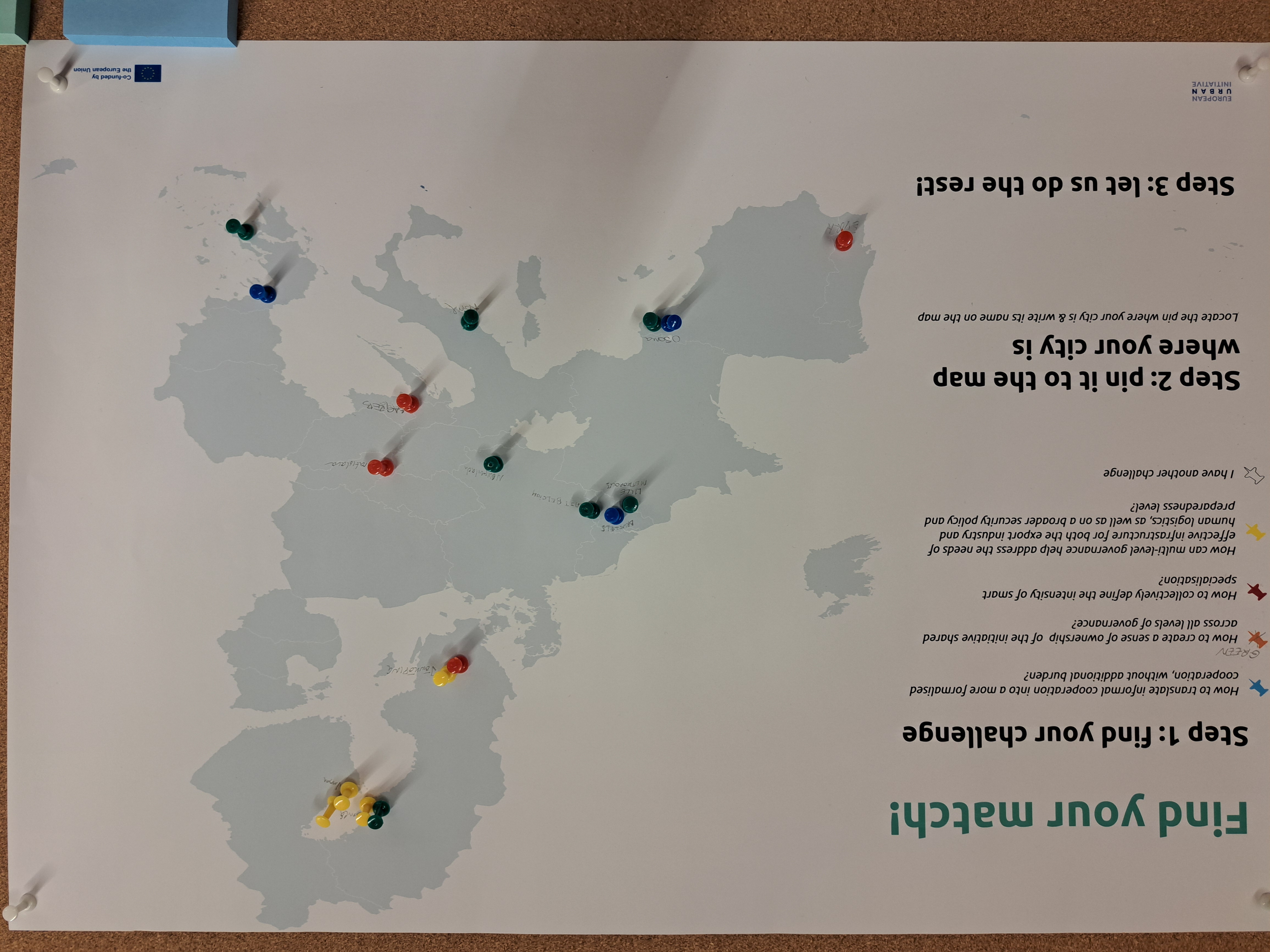Insights into city-region collaboration: building capacity for innovation ecosystems and inclusive economic growth through the lens of multi-level governance
This event was a follow-up from the EUI Capacity Building training ‘Leveraging innovation ecosystems for Sustainable Cities’ organised in May 2024 in partnership with Innocities, and provided an opportunity to dive deeper into the topic of multi-level governance.
The main objective was to explore different EU perspectives on how city-region cooperation works and can be a driver for, and enabler to effectively address the complex political, social, environmental and economic challenges faced by European territories, especially in the context of sustainable urban development, regional growth and the development of innovation ecosystems.
After an overview of the fundamentals of multi-level governance and partnerships in Europe, which included references to the JRC Handbook of Territorial and Local Development Strategies and the Smart Specialisation Strategy framework for multi-level innovation, participants heard about four case studies that provided diverse examples of how cities and regions are implementing multi-level governance and horizontal collaboration frameworks, and discussed specific challenges and solutions in smaller groups.
Bilbao Ekintza's collaborative model: advancing multi-level governance for competitive growth
First, we dived into Bilbao Ekintza’s approach to multi-level governance to develop and grow its knowledge-intensive business services. Using the framework of the RIS3 Basque Country Strategy 2030, Bilbao Ekintza has implemented a new model of relations between triple helix actors, enabling the co-design of efficient policies for Bilbao's competitiveness through shared vision and leadership. In the group exercise, participants addressed the challenge of how to go a step further and embed a shared sense of ownership across all governance levels and partners.
Brussels' collaborative model: formalising multi-level governance for climate action
We then heard about the multi-level governance for climate action approach in the Brussels Capital Region. Through the EMPOWER - Empowering local energy independence through electricity sharing & solar production - project, Brussels-Capital Region innovation agency Innoviris, together with Brussels City and the Municipalities of Schaerbeek, and Ixelles have come together to set up a new collaborative model for climate action, building on the Climate City Contract framework.
In the group exercise, participants looked into the challenge of how the initial informal cooperation can be translated into a more formalised cooperation with clear added value and without creating additional burden and inefficiencies.
Cross-Border collaboration in the Kvarken region: Umeå and Vaasa's multi-level governance for innovation and infrastructure
The third case study took us to Northern Europe across the Gulf of Bothnia. From an infrastructure and connecting project (Auroa Botnia ferry) to the development of the first joint Umeå and Vaasa 2030 Strategy, multi-level governance has proved a key driver and enabler for efficient cross-border cooperation between Umeå (Sweden) and Vaasa (Finland) in the Kvarken region. Within the European grouping of territorial cooperation’s multi-level governance framework, Vaasa and Umeå are fostering a thriving co-creation and innovation ecosystem and are looking to develop the Nordic Connector as a transport connector and living lab within the two cities. In the group exercise, the participants explored the issue of how multi-level governance can help address (or hinder?) the needs of effective and secure infrastructure at a cross-border regional level.
Building resilient specialisation: multi-level governance in Hauts-de-France’s smart strategy
Finally, the Région Hauts-de-France shared their experience of developing and implementing multi-level governance within the framework of their Smart Specialisation Strategy. The region articulates its collaboration with cities by anchoring it to the different sector dynamics and by building on their territorial strengths. In the group exercise, participants addressed the challenge of building meaningful cooperation between all actors to collectively reach the level of intensity for a resilient regional specialisation.
Each case study demonstrated the importance, opportunities and difficulties of adopting a multi-level governance model, and integrating it into the core of their strategic territorial development and innovation ecosystem to address complex challenges.
Key learnings from the workshop
- A shared vision is important, but shared leadership and ownership are key: it is important to know when to step back to let others take the lead.
- Trust-based contracts or pledges signed by all actors, including politicians and business owners, are useful tools to ensure commitment from all.
- In multi-level governance, as in any territorial development matter, one size/ one model does not fit all. Leveraging the local strengths and collaborating to address weaknesses is key.
- Multi-level governance should not be superficial or an additional administrative burden and should clearly add value to all and at all levels. It does not always need to be formalised and it can happen organically within a territory or an ecosystem
- Collaboration, coordination and stakeholder diversity are the fundamentals of efficient multi-level governance.
Despite many challenges to the implementation of multi-level governance in diverse contexts, participants agreed that when managed effectively, multi-level governance is crucial in promoting more inclusive, innovative, and effective policy making across Europe.
Participants also agreed that when addressing a complex topic, hearing and learning first hand from those who have tried it, and having the opportunity to reflect together, is where you generate the most added value.

Capacity Building workshop
If you or your city partners want to learn more about multi-level governance, connect with cities with hands-on experience, or explore collaboration opportunities on this topic, the EUI City-to-City Exchanges provide the ideal ‘easy entry’ point for cities wishing to learn directly from other cities across Europe.
If you have already developed your multi-level governance framework or strategy and want to improve its design and implementation, apply now to the Peer Review call, by 13 November 2024, 12:00 CET.
For more information or advice about the call, book your bilateral online consultation with the EUI Secretariat.
